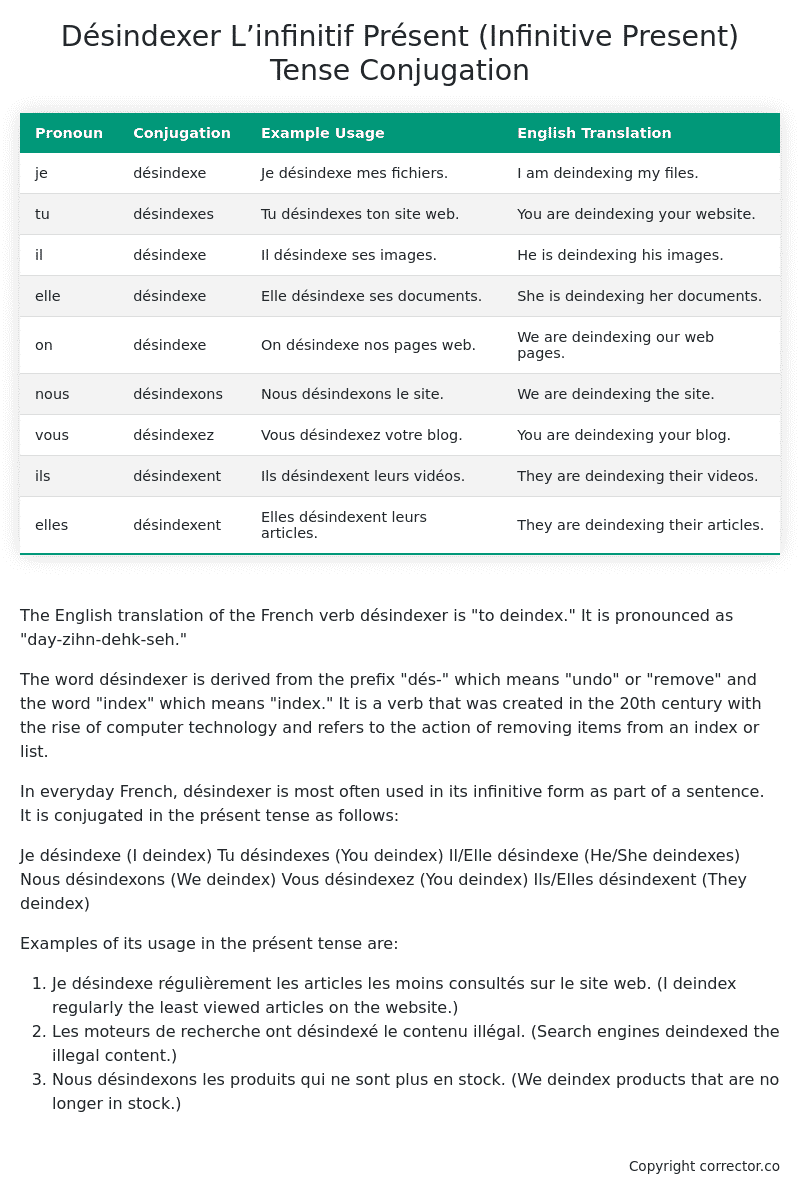L’infinitif Présent (Infinitive Present) Tense Conjugation of the French Verb désindexer
Introduction to the verb désindexer
The English translation of the French verb désindexer is “to deindex.” It is pronounced as “day-zihn-dehk-seh.”
The word désindexer is derived from the prefix “dés-” which means “undo” or “remove” and the word “index” which means “index.” It is a verb that was created in the 20th century with the rise of computer technology and refers to the action of removing items from an index or list.
In everyday French, désindexer is most often used in its infinitive form as part of a sentence. It is conjugated in the présent tense as follows:
Je désindexe (I deindex)
Tu désindexes (You deindex)
Il/Elle désindexe (He/She deindexes)
Nous désindexons (We deindex)
Vous désindexez (You deindex)
Ils/Elles désindexent (They deindex)
Examples of its usage in the présent tense are:
- Je désindexe régulièrement les articles les moins consultés sur le site web. (I deindex regularly the least viewed articles on the website.)
- Les moteurs de recherche ont désindexé le contenu illégal. (Search engines deindexed the illegal content.)
- Nous désindexons les produits qui ne sont plus en stock. (We deindex products that are no longer in stock.)
Table of the L’infinitif Présent (Infinitive Present) Tense Conjugation of désindexer
| Pronoun | Conjugation | Example Usage | English Translation |
|---|---|---|---|
| je | désindexe | Je désindexe mes fichiers. | I am deindexing my files. |
| tu | désindexes | Tu désindexes ton site web. | You are deindexing your website. |
| il | désindexe | Il désindexe ses images. | He is deindexing his images. |
| elle | désindexe | Elle désindexe ses documents. | She is deindexing her documents. |
| on | désindexe | On désindexe nos pages web. | We are deindexing our web pages. |
| nous | désindexons | Nous désindexons le site. | We are deindexing the site. |
| vous | désindexez | Vous désindexez votre blog. | You are deindexing your blog. |
| ils | désindexent | Ils désindexent leurs vidéos. | They are deindexing their videos. |
| elles | désindexent | Elles désindexent leurs articles. | They are deindexing their articles. |
Other Conjugations for Désindexer.
Le Present (Present Tense) Conjugation of the French Verb désindexer
Imparfait (Imperfect) Tense Conjugation of the French Verb désindexer
Passé Simple (Simple Past) Tense Conjugation of the French Verb désindexer
Passé Composé (Present Perfect) Tense Conjugation of the French Verb désindexer
Futur Simple (Simple Future) Tense Conjugation of the French Verb désindexer
Futur Proche (Near Future) Tense Conjugation of the French Verb désindexer
Plus-que-parfait (Pluperfect) Tense Conjugation of the French Verb désindexer
Passé Antérieur (Past Anterior) Tense Conjugation of the French Verb désindexer
Futur Antérieur (Future Anterior) Tense Conjugation of the French Verb désindexer
Subjonctif Présent (Subjunctive Present) Tense Conjugation of the French Verb désindexer
Subjonctif Passé (Subjunctive Past) Tense Conjugation of the French Verb désindexer
Subjonctif Imparfait (Subjunctive Imperfect) Tense Conjugation of the French Verb désindexer
Subjonctif Plus-que-parfait (Subjunctive Pluperfect) Tense Conjugation of the French Verb désindexer
Conditionnel Présent (Conditional Present) Tense Conjugation of the French Verb désindexer
Conditionnel Passé (Conditional Past) Tense Conjugation of the French Verb désindexer
L’impératif Présent (Imperative Present) Tense Conjugation of the French Verb désindexer
L’infinitif Présent (Infinitive Present) Tense Conjugation of the French Verb désindexer (this article)
Struggling with French verbs or the language in general? Why not use our free French Grammar Checker – no registration required!
Get a FREE Download Study Sheet of this Conjugation 🔥
Simply right click the image below, click “save image” and get your free reference for the désindexer L’infinitif Présent tense conjugation!

Désindexer – About the French L’infinitif Présent (Infinitive Present) Tense
Forming the Infinitive Present
Common Everyday Usage Patterns
As a Verb’s Dictionary Form
After Modal Verbs
As an Imperative
In Infinitive Clauses
Interactions with Other Tenses
Present Tense
Future Tense
Conditional Tense
Passé Composé
Imperfect Tense
Subjunctive and Conditional Moods
Summary
Want More?
I hope you enjoyed this article on the verb désindexer. Still in a learning mood? Check out another TOTALLY random French verb conjugation!


